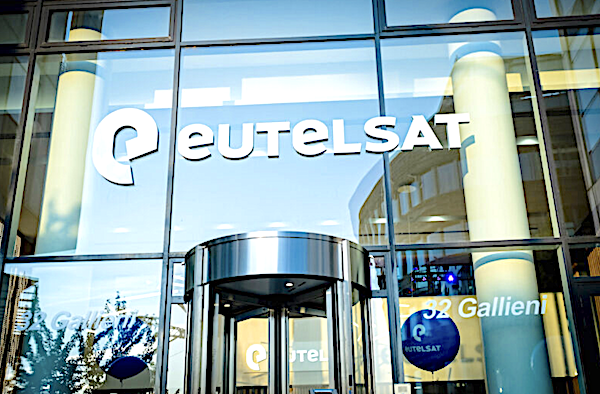
Within minutes of Eutelsat releasing its half-yearly results on February 14th a major sell-off by shareholders occurred, and drove Eutelsat’s share price down to another ‘all time low’ of just €1.39 a share, and a 11.4 per cent fall on the day. A week earlier they were trading at about €1.80. A month ago, they were at €2.23. Six months ago, they traded at €4.62. The loss of €2.83 per share over the past six months is unprecedented.
The worries for shareholders and the industry in general are many. Shareholders have already given up any prospect of receiving a dividend on their stock. The departure of four directors plus the company’s Chairman is also a major worry, and some questions remain as to how the satellite operator can pay its way in the upcoming SpaceRISE consortium which will cost Eutelsat about €2.1 billion.
Eutelsat is repurposing its current Konnect VHTS craft’s mission. It is a 500-gigabit-per-second satellite and was launched to geostationary orbit in 2022 for consumer broadband over Europe and Africa. Eutelsat will reposition the satellite to serve higher-paying mobility customers in other markets and possibly for direct-to-aircraft services.
Eutelsat CEO Eva Berneke said Konnect VHTS is currently providing connectivity to major customers in Spain, Switzerland and France, but adding that Italian telco TIM has opted not to proceed with migrating to the VHTS satellite and puts into question an agreement with TIM that was said to be worth €150 million in 2020. TIM was expected to transfer its broadband and data traffic on from Eutelsat’s earlier 75-Gbps Konnect satellite to Konnect VHTS once Konnect VHTS was operational at 3 degrees East.
TIM has refused to migrate its business and Eutelsat says it has “legal recourse” to pursue its claim. However, the underlying message behind TIM’s decision is worrying for Eutelsat. TIM already has a Memorandum of Understanding in place with AST SpaceMobile for its Brazilian market. Vodafone Italy, TIMs main competitor, is now owned by Swisscom, and it will be interesting to see what happens with TIM’s Italian market and whether an agreement with AST emerges.
Eutelsat has also reviewed its GEO fleet in general. It has taken a €535 million impairment charge against future business expectations. Indeed, while GEO satellites will be around for generations to come, they are no longer the ‘cash cow’ they once were because of the decline in high-value DTH television broadcasting.
It also made an impairment charge of €117 million because of problems with its 115 West B and 117 West A satellites serving Latin America.
Berneke referenced the threat from Elon Musk’s Starlink, which uses low Earth orbiting (LEO) satellites and is currently winning the battle for broadband users and emphasized Eutelsat’s shift to LEO satellites with OneWeb.
Eutelsat’s commitment to the SpaceRISE IRIS² consortium and its planned 264 LEO satellites, and part of Eutelsat’s plan to deploy 440 satellites (and an overall cost of €2.3 billion), part of the batch configured for OneWeb usage. 100 of these ‘follow-on’ satellites are already in production by Airbus.
But OneWeb, acquired with much fanfare in 2023 and with help from the UK government and India’s Bharti, is proving a very slow earner of cash. Berneke admitted that revenues from OneWeb were lower than previously expected. That shortfall is down to the slower than expected deployment of OneWeb’s all-important Earth ‘gateways’. It has deployed 39 gateways. “We still have around five gateways to go in some of the complicated places like Tanzania and Senegal and Martinique,” Berneke said, “and those are flowing into second half of the year.” OneWeb, despite Bharti’s local help, has yet to receive permission to operate in India.
Nevertheless, Eutelsat’s overall H1 revenues grew 5.9 per cent over the previous year. And down the line the IRIS² scheme will generate billions in revenues for the consortium members.
But stumping up the cash for these new developments will again mean that shareholders are denied any sort of dividend for some years to come (the dividend holiday was originally for a two-year period). Eutelsat is looking to obtain export-credit financing for its LEO expansion. Currently, Eutelsat has some €2.7 billion of debt on its books (and the equivalent of 3.92 times its adjusted EBITDA) and at an average interest rate of 4.84 per cent. Eutelsat can call on further credit plus cash in its coffers totaling €1.24 billion as at December 31st.
Meanwhile, Eutelsat is tightening its financial belt. It has trimmed its capital expenditure this financial year from €750 million to €550 million.
But questions remain over the company’s prospects as a going concern. One observer described the dilemma, saying ‘What a mess’ and adding that there were now very real threats of Eutelsat defaulting on its debt obligations. Another asked : “How could they raise another €2bn committed to IRIS²? How could they even survive until IRIS² is operational by 2030 whilst OneWeb Gen1 keeps deteriorating? Will IRIS² funding collapse? “Spreads on five-year CDS on Eutelsat, which has debts of almost €2bn, have climbed more than 800 basis points to 1,220bp in the past six months. That implies that investors now give Eutelsat a 65 per cent chance of defaulting on its bonds.”
The ratings agencies have generally marked Eutelsat’s prospects down and as “Underperform”. One financial report (from Boursier.com/ODDO BHF) says: “[We] note that the bad news is the warning for fixed connectivity in the second half of the year and the fact that board members are resigning. Its ‘underperform’ rating and price target of €1.7 reflect the current risk of financial failure of the OneWeb constellation, which needs to be addressed in order to reassess the group.”
Advanced Television
